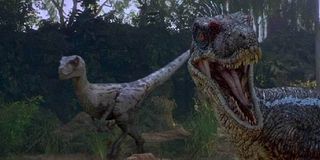Dinosaurs Weren't Warm Or Cold Blooded?

Turns out dinosaurs weren’t the cold-blooded lizards you once thought them to be. The crazy thing is, they weren’t warm-blooded either, but actually somewhere in between. So dinosaurs were lukewarm-blooded? It’s a bit more complicated than that, but it may have a lot to do with why dinosaurs ruled the world for as long as they did.
“Mesothermic” animals still live among us today. Leatherback turtles, tuna, and great white sharks all have mesothermic blood, which could explain why they are all massive compared to their evolutionary cousins. Warm blood, Discovery writes, allows for growth patterns ten times larger than cold-blooded animals, and can be measured by annual “growth rings” in the bones. Warm-blooded animals are known to metabolize and grow larger than cold-blooded animals today, so scientists dug in expecting to confirm that dinos were warm-blooded. While there were some exceptions, neither indicator was found in the bones, and the researchers were led to the conclusion that dinosaurs were mesothermic.
If mesothermic blood is the link between dinosaurs and the species of today, then the common denominator is big. While there is no known link between mesothermic blood and size, perhaps the metabolic rates of those with a “just right” blood type are larger than even warm-blooded animals. Having a mesothermic bloodline does have some evolutionary advantages that likely led to the long existence dinosaurs had on Earth.
A great white shark, which can grow up to 15 feet long and weigh a literal ton, can live off of 66 pounds of meat every 15 days, at max. For a species that big, that food intake averages out to one seal pup every three days. Considering the size of a great white, that’s pretty impressive, but not quite as impressive as cold-blooded animals who can stretch out one meal over a week's time. As mentioned earlier, a con to being a cold-blooded animals is growing ten times under the rate of a warm-blooded animal. So it can be theorized that dinosaurs managed to stay on top due to having a growth rate similar to warm-blooded animals, but also having the metabolism closer to that of the cold-blooded animals. Seems simple enough to me, IF dinosaurs are indeed lukewarm-blooded, which is still very much up for debate.
CINEMABLEND NEWSLETTER
Your Daily Blend of Entertainment News

Mick Joest is a Content Producer for CinemaBlend with his hand in an eclectic mix of television goodness. Star Trek is his main jam, but he also regularly reports on happenings in the world of Star Trek, WWE, Doctor Who, 90 Day Fiancé, Quantum Leap, and Big Brother. He graduated from the University of Southern Indiana with a degree in Journalism and a minor in Radio and Television. He's great at hosting panels and appearing on podcasts if given the chance as well.

I Got Caught Up On Physical 100 On Netflix And It's One Of The Most Inspirational Reality Competition Shows I've Seen In A Long Time

One Piece’s Biggest Dubbed Episode To Date Is Coming To Streaming, And Just In Time For Monkey D. Luffy’s Birthday

TV Icon Tom Selleck Talks 'Accidental Career' And Why He Was Hesitant To Tell Life Story Even In The Era Of Celeb Memoirs
Most Popular




